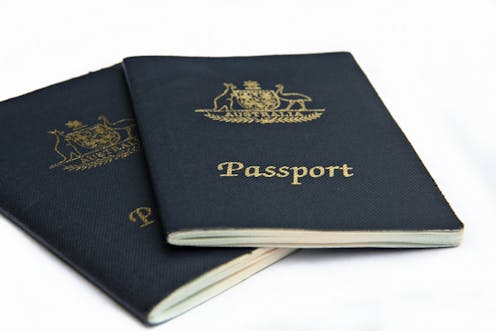How a proposed new bill would make it easier to strip Australian citizenship
- Written by Rayner Thwaites, Senior Lecturer, Sydney Law School, University of Sydney

Last month, the federal government introduced a bill into parliament that, if passed, will make it easier to strip an Australian of citizenship by:
- making lesser offences a trigger for deprivation
- dropping the requirement that, to trigger deprivation, a conviction or convictions result in a term of imprisonment of at least six years
- weakening and complicating protections against the creation of statelessness.
These amendments are directly contrary to bipartisan recommendations of the Parliamentary Joint Committee on Intelligence and Security, contained in its report of September 2015. Those recommendations were followed when parliament inserted the current citizenship stripping provisions into the Australian Citizenship Act 2007 in December 2015.
Expanding the scope, and lowering the threshold, for deprivation
The proposed amendments address what an earlier Conversation piece referred to as “conviction-based citizenship deprivation”, one of three mechanisms for deprivation introduced into the Act in 2015.
Of the offences currently listed as potential triggers for deprivation, some are directed at terrorism and some are without that connection (for example sabotage and espionage). All carry a maximum sentence of ten years or more: for example treason (life); espionage (life); directing the activities of a terrorist organisation (ten years) or; membership of a terrorist organisation (ten years).
This enacts the view of the parliamentary committee that ten years served to mark out the offences sufficiently serious to warrant deprivation. Further, the parliamentary committee determined that even when convicted of such an offence:
there will still be degrees of seriousness of conduct and degrees to which conduct demonstrates a repudiation of allegiance to Australia.
The committee also insisted on an additional requirement that the relevant convictions result in a sentence of at least six years imprisonment in total.
These two important existing limitations on the deprivation power are breached by the government’s proposed amendments:
the offence of “associating with terrorist organisations” has been added to the terrorism offences that trigger deprivation. This is an offence with a maximum sentence of only three years, radically under the ten years previously required
the requirement that conviction carry a sentence of at least six years has been dropped in relation to all the nominated offences designated “terrorism offences”. However, it remains in place for “other offences” such as espionage, sabotage and foreign incursions
the new lower standards apply retrospectively to convictions from 12 December 2005 in relation to the relevant terrorism offences.
Weakening, and complicating, protections against statelessness
The proposed amendments also weaken the safeguards on the creation of statelessness. Currently, a person can only be deprived of citizenship under the provision if he or she “is a national or citizen of a country other than Australia” at the time when the minister strips him or her of citizenship. This is to ensure that the minister does not render the person stateless.
The proposed amendments replace that test, instead providing that the minister can deprive a person of Australian citizenship if:
the Minister is satisfied that the person would not […] become a person who is not a national or citizen of any country.
The proposed formulation substitutes the minister’s satisfaction for the facts of the matter. But under Australia’s international law commitments on statelessness, the minister’s opinion is irrelevant. What matters is whether the person is a citizen under the domestic law of the foreign country concerned.
If the minister’s view that a person is a citizen of country X diverges from the view held by the authorities in country X, there is a practical impasse. If country X determines the person is not one of its citizens and accordingly refuses to admit them, and Australia denies the newly minted non-citizen a visa, deprivation may result in the former Australian citizen being held in indefinite immigration detention.
Read more: New laws make loss of citizenship a counter-terrorism tool
And the nature of the inquiry has changed. In context, the word “become” muddies the time at which the person must have another nationality. It invites the possibility that deprivation will render a person stateless, but that, over some unspecified period, they will become the national of another country.
These comments on statelessness should be understood in the context of Australia’s opaque process for determining a person’s foreign nationality or nationalities. In the United Kingdom, for example, a person has a statutory right to appeal a ministerial decision to strip them of citizenship.
In the exercise of these appeal rights, the most frequently litigated issue is whether a person has another nationality (the Pham case is a prominent example). Expert witnesses are called and cross-examined on difficult questions of foreign nationality law.
None of this institutional infrastructure is provided for under the Australian legislation. How these issues are resolved needs attention. If parliament has learned anything in the past few years, it should be that determining whether a person has a foreign citizenship is no simple matter.
The Parliamentary Joint Committee on Intelligence and Security has announced an inquiry into the Bill. Submissions close on January 11, 2019.
Authors: Rayner Thwaites, Senior Lecturer, Sydney Law School, University of Sydney



















